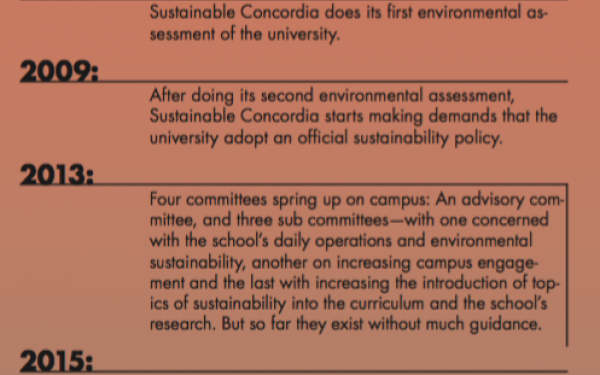Linking Human Rights and Sustainability
Concordia to Host Symposium Offering Interdisciplinary Look into our Sustained Future
When it comes to sustainability, human rights might not be the first thing that comes to mind.
But Fulbright Canada Visiting Research Chair Carol Gray says a link exists between the two—a link that will be explored at Concordia’s inaugural Symposium on Sustainability and Human Rights on Nov. 21 to Nov. 22.
Hosted by the Loyola College for Diversity and Sustainability in partnership with Fulbright, a not-for-profit international scholarship program that works to promote educational exchange between Canada and the United States, the symposium promises to shake up the usual format of academic conferences, with undergraduate students even figuring among the panellists.
“In some conferences you go and hear what people say, it’s all lectures, then you leave,” Gray told The Link. “Our learning has to be more than in the classroom.”
In addition to round-table discussions, there will also be field trips examining the topics of sustainability and human rights in the community. Tours of Concordia’s Centre for Oral History and Digital Storytelling and of the United Nations’ Montreal-based Secretariat of the Convention for Biological Diversity, where three presentations will also be given, are planned.
Gray says sustainability is not solely related to the environment, suggesting it’s also a “concept of creating permanent structures that are part of long-lasting, stable societies.”
Offering Egypt as an example to further illustrate this idea, she said that building a country “not founded on the respect for human rights” leads to the mobilization of “millions of people on the streets and leaders being overthrown by military coups,” as well as “people dying because there’s no respect for the right to protest.”
This relationship will be examined through the lenses of oral history, food culture, women’s issues, social justice and climate change.
For instance, Moisson Montréal community relations manager Jonathan Rodrigue was invited to speak at the conference about avoiding food waste through the transfer of still-edible meat to food banks. Moisson Montréal works with supermarkets to save meat that is about to reach its “best if used by” date. They freeze it and store it, and then distribute it in food banks throughout the Montreal region.
“Some people [at the symposium] are talking about scholarly articles, and some people are talking about models of sustainability being used in the community right now,” said Gray. “We try to merge the problems with the solutions, the scholarly theory with the practical application.”
Moreover, different groups will be participating in the discussions.
“We want students to get more than an intellectual experience, we want that experience to be connected to an activity that relates to the more theoretical discussions,” Dr. Rosemarie Schade, principal of the Loyola College, told The Link. “So, for examples, there will be a panel on food and later on, a tour of the Loyola Campus and its sustainable initiatives.”
The Loyola College has sought to integrate the concept of sustainability into its multidisciplinary academic curriculum, which makes the symposium a perfect fit.
Of the eight Concordia students participating in the conference, four are undergraduates. The other four are PhD candidates. Fulbright scholars, faculty and community members will also contribute to the panels.
According to Gray, the symposium’s working environment does not follow a hierarchy, which makes it a rather dynamic and stimulating place for students to gain presentation and organization skills aside from learning from the topic.
“We are trying to be as inclusive as possible,” she said. “It helps students see themselves in a different light.”
As of Nov. 18, 27 people have reserved places for Thursday and 38 for Friday. There is still space available for each morning and many spaces available for the afternoon field trips.
“It’s an incredible turnout given that the online registration form was made available only a couple of days ago,” said Adan Suazo, assistant to the college’s principal and Loyola Sustainability Research Centre coordinator. “Especially for Friday, because it takes place at Loyola, and getting people to [go there] is already a challenge.”
Entrance to the conference is free of charge, but attendees are encouraged to register online. For details on the symposium, visit Loyola College’s website or contact Carol Gray at carol.gray@concordia.ca.

_787_1050_90.jpg)

2WEB_600_375_90_s_c1.jpg)


__600_375_90_s_c1.jpg)